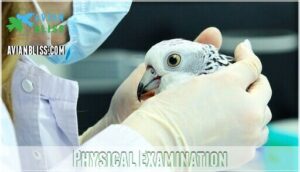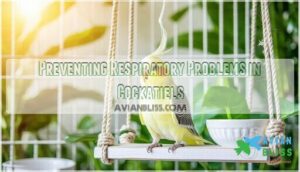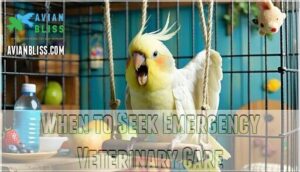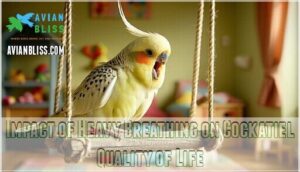This site is supported by our readers. We may earn a commission, at no cost to you, if you purchase through links.
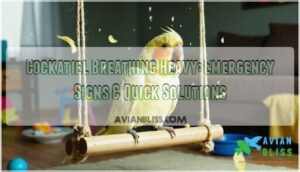
Watch for tail bobbing during rest, open-mouth breathing, wheezing sounds, colored nasal discharge, and lethargy combined with appetite loss. Move your bird to a quiet, well-ventilated area at 75-80°F while arranging urgent veterinary care.
Since cockatiels hide illness until severely compromised, any noticeable breathing difficulty requires immediate professional evaluation—waiting could cost precious time when every breath counts for your feathered friend’s survival and recovery. This situation is a potential emergency that highlights the importance of urgent action to ensure the bird’s well-being, making urgent veterinary care crucial.
Table Of Contents
- Key Takeaways
- Common Causes of Heavy Breathing in Cockatiels
- Recognizing Signs of Respiratory Distress in Cockatiels
- Immediate Actions for Cockatiel Breathing Difficulties
- Diagnosing Respiratory Issues in Cockatiels
- Treating Heavy Breathing in Cockatiels
- Preventing Respiratory Problems in Cockatiels
- When to Seek Emergency Veterinary Care
- Long-term Management of Cockatiel Respiratory Health
- Impact of Heavy Breathing on Cockatiel Quality of Life
- Frequently Asked Questions (FAQs)
- Why is my bird breathing so heavily?
- How do you know if your bird is having trouble breathing?
- What are signs of illness in cockatiels?
- Why is my cockatiel gasping for air?
- What are the most common causes of heavy breathing in cockatiels?
- How can I tell if my cockatiel is in respiratory distress?
- What should I do if my cockatiel is struggling to breathe?
- Can cockatiels breathe heavily during normal molting?
- Do baby cockatiels naturally breathe faster?
- Is heavy breathing normal after flight?
- Conclusion
Key Takeaways
- Watch for emergency signs: If you notice tail bobbing, open-mouth breathing, or puffed feathers combined with lethargy, contact your avian vet immediately—cockatiels hide illness until they’re critically compromised.
- Create a safe environment quickly: Move your bird to a quiet, well-ventilated area at 75-80°F while arranging urgent veterinary care, as environmental factors can worsen breathing difficulties.
- Don’t wait for symptoms to worsen: Heavy breathing in cockatiels signals serious conditions like respiratory infections, toxin exposure, or heart problems that require immediate professional evaluation.
- Prevention beats emergency care: Maintain proper cage hygiene, ensure good air quality, avoid household toxins like Teflon fumes, and schedule regular vet checkups to prevent respiratory crises before they start.
Common Causes of Heavy Breathing in Cockatiels
When your cockatiel’s breathing becomes labored, you’re likely witnessing one of several serious respiratory conditions that require immediate attention.
Heavy breathing in cockatiels signals serious trouble that demands your immediate attention and swift action
Understanding these underlying causes helps you respond quickly and potentially save your bird’s life during a breathing emergency and one of several serious respiratory conditions that require immediate attention is key, specifically during a breathing emergency.
Respiratory Infections
Against respiratory infections, your cockatiel faces serious threats requiring immediate attention. Bacterial pneumonia and fungal infections like aspergillosis compromise breathing rapidly, while respiratory viruses spread through airborne pathogens.
- Wheezing sounds during normal activity
- Nasal discharge with colored secretions
- Tail bobbing while breathing at rest
- Lethargy combined with decreased appetite
Stress and Anxiety
Stress triggers cockatiel breathing heavy episodes faster than you’d expect. Cockatiel Phobias from sudden movements or loud sounds cause immediate respiratory distress. You’ll notice tail bobbing and rapid chest movements when anxiety hits.
Noise Reduction helps tremendously – try moving their cage away from TVs or busy areas. Environmental Enrichment and gentle Social Interaction work as natural Calming Techniques for anxious birds.
Environmental Factors
Several environmental hazards can trigger heavy breathing in your cockatiel. Poor air quality from household chemicals, dust, or smoke creates respiratory irritation that forces your bird to work harder for each breath.
Common environmental triggers include:
- Air Pollution – Cigarette smoke, cooking fumes, and aerosol sprays release toxic particles
- Humidity Control issues – Too dry (below 40%) or humid (above 70%) air stresses respiratory systems
- Indoor Toxins – Teflon poisoning from overheated cookware causes sudden, severe breathing difficulties
Underlying Health Conditions
Heart Disease and Obesity Factors can silently sabotage your cockatiel’s breathing, making every breath a struggle. Chronic Infections lurk beneath the surface, while Liver Issues and Kidney Problems create cascading health crises.
When your cockatiel breathing heavy persists, these respiratory problems demand immediate attention from an avian vet for proper diagnosis and treatment. Recognizing respiratory tract issues is essential for identifying the underlying causes of heavy breathing in cockatiels.
Overheating or Heat Stress
When temperatures climb, your cockatiel’s respiratory system goes into overdrive. Heat stroke and thermal stress trigger rapid, labored breathing as your bird desperately tries cooling down. You’ll notice open-mouth breathing, wing spreading, and panting.
Proper temperature control, adequate ventilation systems, and humidity management prevent dangerous overheating that causes cockatiel breathing heavy episodes.
Recognizing Signs of Respiratory Distress in Cockatiels
Recognizing respiratory distress in your cockatiel requires watching key breathing patterns and physical changes. Look for tail bobbing with each breath, openmouth breathing, and rapid chest movements – healthy birds breathe through closed beaks.
Check feather condition for puffing, which indicates your bird’s trying to conserve body heat. Monitor beak coloration for bluish tinting and watch for eye symptoms like discharge or squinting.
When your cockatiel breathing heavy shows these signs, respiratory signs demand immediate attention since birds hide illness expertly.
Immediate Actions for Cockatiel Breathing Difficulties
When you notice your cockatiel breathing heavily, your first priority is creating a safe recovery space and getting professional help quickly.
You’ll need to act fast while staying calm, as respiratory distress can escalate rapidly in these small birds.
Providing a Calm Environment
When your cockatiel experiences respiratory distress, environmental modifications can substantially reduce stress levels. Create a Calm Space Creation sanctuary by relocating the cage away from household chaos.
- Gentle Handling – minimize physical contact during breathing episodes
- Quiet Time Management – eliminate television, music, and loud conversations
- Soothing Lighting – dim harsh fluorescent bulbs to soft ambient levels
- Peaceful Ambient Sound – remove startling noises like vacuum cleaners
Heavy breathing episodes worsen with stimulation, so maintain tranquil surroundings. Utilizing calming products can also help alleviate stress in cockatiels.
Adjusting Temperature and Humidity
When you’ve created a calm space, temperature regulation and humidity control become your next priorities for cockatiel breathing relief. Set your bird’s environment to 75-80°F (24-27°C) while maintaining 50-60% humidity levels. This thermal comfort supports respiratory health issues by reducing airway stress.
Use a hygrometer to monitor environmental balance – proper air quality helps ease heavy breathing and respiratory distress naturally. Maintaining ideal humidity levels is vital for the overall health and well-being of your cockatiel.
Offering Fresh Water and Food
Proper hydration and nutrition play vital roles when your cockatiel’s breathing heavily. You’ll want to make certain clean, fresh water stays available at all times, as respiratory distress can quickly lead to dehydration. Check water quality daily and replace it with filtered or bottled water if your tap water contains chlorine or other chemicals.
Fresh Food Options should include easily digestible favorites like:
- Soft fruits (apple slices, grapes) for quick energy
- Leafy greens (kale, spinach) rich in vitamins
- High-quality pellets moistened slightly for easier consumption
Avoid forcing food, but gently encourage eating by placing favorite treats nearby. Hydration Techniques like adding a shallow dish for easier access can help. Emergency Rations of hand-feeding formula may become necessary if your bird won’t eat independently. Nutrient Supplements should only be given under veterinary guidance to support recovery without overwhelming their stressed system.
Monitoring Behavior Closely
After ensuring your cockatiel has fresh water and food available, watch for behavioral signs that indicate worsening respiratory distress. Document breathing patterns, feather condition, and beak color changes. Your bird’s activity levels may drop substantially during episodes of heavy breathing.
| Normal Behavior | Warning Signs | Emergency Symptoms |
|---|---|---|
| Active chirping | Quiet, withdrawn | Silent, motionless |
| Smooth breathing | Tail bobbing | Open mouth breathing |
| Bright, alert eyes | Sleepy, squinting | Eyes closed, unresponsive |
| Perching upright | Sitting low on perch | Sitting on cage bottom |
| Normal feather position | Slightly puffed feathers | Severely ruffled plumage |
Notice if your cockatiel stops playing with toys or avoids favorite perches—these subtle changes often signal labored breathing before obvious symptoms appear.
Preparing for Emergency Vet Visit
When your cockatiel’s breathing becomes labored, getting ready for an emergency veterinary care visit can feel overwhelming. However, being prepared makes all the difference between panic and swift action. Here’s your essential Vet Visit Prep checklist:
- Secure Transport Safety: Use a well-ventilated carrier with familiar perches and soft bedding to minimize stress during the journey
- Contact Your Avian Vet: Call ahead to describe your cockatiel’s respiratory distress symptoms and arrange immediate care
- Gather Emergency Kits: Collect recent medical records, current medications, and any Bird First Aid supplies you’ve used
- Document Symptoms: Note breathing patterns, duration of heavy breathing episodes, and behavioral changes for the veterinarian
- Maintain Owner Readiness: Stay calm yourself—your cockatiel will pick up on your anxiety, potentially worsening their condition
Keep your bird warm but not overheated during transport, and avoid unnecessary handling that could increase their respiratory distress.
Diagnosing Respiratory Issues in Cockatiels
When your cockatiel’s breathing becomes labored, your vet will use several diagnostic tools to pinpoint the exact cause.
These tests help rule out infections, blockages, and other serious conditions that require immediate treatment.
Physical Examination
When your bird shows heavy breathing, a thorough physical examination becomes your first line of defense. The veterinarian will conduct a thorough assessment to identify underlying causes of respiratory distress.
Key examination components include:
- Beak Inspection – checking for discharge, discoloration, or breathing obstructions
- Eye Examination – looking for swelling, discharge, or signs of infection
- Feather Condition – evaluating for puffed appearance indicating illness
The vet will evaluate skin checks around the chest area, perform wing palpation to detect abnormalities, and observe for tail bobbing or open mouth breathing patterns that signal labored breathing requiring immediate intervention.
Blood Tests and Cultures
After your avian vet completes the physical examination, they’ll likely recommend specific blood tests and cultures to pinpoint what’s causing your cockatiel’s respiratory distress. These diagnostic tools work like detective work – they reveal hidden clues about infections that aren’t visible during examination alone. Your avian veterinarian will collect blood samples for hematology analysis and serum biochemistry testing.
Blood culture results help identify bacterial infections, while specialized tests detect fungal pathogens. Fecal testing provides additional insights into systemic health issues affecting respiratory function. The avian vet must consider avian biochemistry when interpreting test results to confirm accurate diagnosis and treatment.
| Test Type | Purpose | Timeline |
|---|---|---|
| Complete Blood Count | Detects infection markers and anemia | Same day results |
| Blood Chemistry Panel | Evaluates organ function and hydration | 24-48 hours |
| Bacterial Isolation Cultures | Identifies specific respiratory pathogens | 2-5 days |
| Serum Biochemistry | Assesses liver/kidney function | 24 hours |
| Molecular PCR Testing | Rapid pathogen identification | 1-3 days |
These thorough tests guide targeted treatment for respiratory problems. Your avian veterinary care team uses results to select appropriate antibiotics or antifungal medications, guaranteeing your bird gets exactly what they need to breathe easier again.
X-rays and Imaging
Capturing clear diagnostic imaging helps pinpoint what’s causing your cockatiel’s respiratory distress. Radiographic techniques and avian X-rays reveal hidden issues like blockages or infections that aren’t visible during physical exams.
Your vet will discuss sedation risks since sick birds face higher complications. These respiratory scans provide essential answers when heavy breathing persists despite initial treatments.
Endoscopy
Endoscopy offers vets a direct look inside your cockatiel’s airways when heavy breathing persists. This Avian Endoscope procedure uses a tiny camera to examine nasal passages, throat, and air sacs for blockages or infections.
Veterinary Endoscopy helps pinpoint exact causes of respiratory distress that X-rays might miss, giving your vet the complete picture needed for targeted treatment.
Fecal Analysis
Your vet might ask for a Fecal Exam to uncover hidden causes behind your cockatiel’s heavy breathing. This simple Poop Sampling reveals Parasite Testing results, bacterial overgrowth, and Gut Health imbalances that can trigger Respiratory Problems. The Avian Microbiome affects your bird’s entire system, making this test surprisingly valuable.
Key findings from Cockatiel Health fecal analysis include:
- Parasite Testing for roundworms, tapeworms, and protozoa
- Bacterial cultures identifying harmful organisms
- Digestive System Problems causing secondary breathing issues
- Yeast overgrowth affecting overall Cockatiel Health Issues
- Inflammatory markers suggesting Digestive Problems
Treating Heavy Breathing in Cockatiels
Once your vet diagnoses the cause of your cockatiel’s heavy breathing, targeted treatment can begin immediately to address the underlying condition.
Treatment options range from antibiotics for infections to supportive therapies that help your bird breathe easier while recovering.
Antibiotics for Bacterial Infections
When your avian vet diagnoses bacterial respiratory infections, antibiotics become your bird’s lifeline. These medications target harmful bacteria causing heavy breathing and respiratory distress. Here’s what you need to know about infection treatment:
- Bacterial resistance develops when you skip doses – complete the full course
- Antibiotic dosage must be precise – too little won’t work, too much harms
- Bird medication requires careful timing – missed doses restart the battle
- Respiratory therapy works best with consistent treatment – your vigilance saves lives
Common antibiotics like Doxycycline effectively combat respiratory infections, but success depends on following your vet’s exact instructions for proper respiratory therapy.
Antifungal Medications
When fungal infections attack your cockatiel’s respiratory system, antifungal medications become your bird’s lifeline. Your vet will likely prescribe itraconazole, the gold standard for fungal disease management in birds.
| Medication | Common Usage |
|---|---|
| Itraconazole | Primary antifungal therapy for aspergillosis |
| Voriconazole | Severe or resistant fungal infections |
| Amphotericin B | Critical cases requiring hospitalization |
| Terbinafine | Alternative for specific fungal strains |
| Fluconazole | Mild infections or maintenance therapy |
These antifungals pack a punch against respiratory infections, but medication side effects can include liver stress and digestive upset. Effective prevention strategies involve understanding fungal growth factors to minimize the risk of infection in the first place.
Nebulization Therapy
When your cockatiel struggles with respiratory distress symptoms, nebulization therapy delivers targeted breathing treatments directly to affected airways. This aerosol therapy uses nebulizer machines to create fine mists that reach deep into your bird’s respiratory system.
Benefits include:
- Reducing inflammation and throat swelling effectively
- Increasing ventilatory capacity for easier breathing
- Improving oxygen levels throughout the body
- Shortening recovery time from respiratory problems
- Healing damaged respiratory mucosal tissues
Key considerations:
You’ll need proper inhalation techniques and pediatric masks for safe administration. Daily treatments typically run one to four months, depending on your cockatiel breathing difficulties’ severity. While effective respiratory support, monitor for potential side effects like appetite loss during extended treatment periods. The use of a Bird Nebulizer device is essential for successful nebulization therapy.
Supportive Care and Fluids
Supportive care acts as your cockatiel’s safety net during respiratory distress. Fluid therapy and hydration management prevent dehydration while humidity control soothes irritated airways.
Your avian vet may recommend nutrient supplements to boost recovery. Calming techniques reduce stress that worsens heavy breathing. Think of it as creating a healing cocoon—warmth, moisture, and gentle care help your feathered friend bounce back from respiratory health issues.
Dietary Adjustments
Proper nutrition plays a pivotal role when your cockatiel is breathing heavily. A well-balanced diet strengthens their immune system and supports respiratory recovery.
- Pellet Nutrition: Switch from seed-heavy diets to high-quality pellets containing vitamin A, which directly supports bird respiratory health and helps combat respiratory problems.
- Fresh Food: Offer leafy greens, carrots, and sweet potatoes daily. These seed alternatives provide essential nutrients that boost healing.
- Water Quality: Confirm clean, filtered water availability. Poor hydration worsens breathing difficulties, while proper nutrient supplements recommended by your vet can accelerate recovery in birds with respiratory issues.
Preventing Respiratory Problems in Cockatiels
You can prevent most respiratory problems in your cockatiel by maintaining proper cage hygiene and ensuring good air quality in their environment.
Regular veterinary check-ups, a balanced diet, and stress reduction techniques will keep your bird’s respiratory system healthy and strong, which is aided by good air quality.
Proper Cage Hygiene
Daily cage cleaning is your first line of defense against respiratory problems. Remove droppings, old food, and debris that harbor harmful bacteria.
Weekly deep cleaning with bird-safe disinfectants keeps feather dust under control. Clean perches and sanitize toys regularly—these spots collect germs your cockatiel breathes in daily.
Effective cage cleaning requires proper cage cleaning supplies to maintain a healthy environment. It also involves proper cage cleaning supplies to ensure all aspects of the cage are clean and safe for your cockatiel.
Air Quality Management
Beyond keeping your cage spotless, air quality management stands as your next line of defense against heavy breathing in cockatiels. Clean air isn’t just nice to have—it’s life-saving for birds whose respiratory systems are incredibly sensitive to airborne irritants.
Air Purification starts with choosing the right equipment. HEPA filters capture 99.97% of particles, including dust mites and mold spores that trigger respiratory problems. Position your air purifier near your cockatiel’s cage for maximum effectiveness.
Ventilation Systems require 4-6 air exchanges hourly to prevent toxic fume buildup. Poor airflow increases respiratory disease risk by 35%. Open windows when weather permits, but avoid drafts that stress birds.
Humidity Control maintains ideal 40-60% levels. Dry air irritates airways, while excess moisture breeds harmful bacteria. Use humidity meters for accurate monitoring.
Here’s your air quality checklist:
- Install HEPA air purifiers rated for pet dander
- Eliminate tobacco smoke (increases complications 65%)
- Ban aerosol sprays and air fresheners containing VOCs
- Remove essential oil diffusers (toxic to cockatiels)
- Monitor ammonia levels from droppings buildup
Real-time air quality monitors track pollution reduction, helping prevent bird breathing difficulties before they escalate. Understanding respiratory toxin exposure is vital for maintaining a healthy environment for your cockatiel.
Regular Veterinary Check-ups
Annual Checkups with an avian vet keep your cockatiel healthy. These Vet Visit Schedules catch Respiratory Problems before they become serious. Your Avian Veterinarian performs Health Screening Tests and creates Bird Wellness Plans customized to your pet’s needs.
| Checkup Component | Frequency |
|---|---|
| Physical examination | Every 6-12 months |
| Blood work screening | Annually |
| Fecal parasite testing | Bi-annually |
| Weight monitoring | Every visit |
| Respiratory assessment | Each checkup |
Preventive Care Tips from your vet help maintain Cockatiel Health year-round through proper Veterinary Care for Birds.
Balanced Diet and Nutrition
Nutrition-focused feeding strengthens your cockatiel’s respiratory system naturally. High-quality pellet nutrition should comprise 75% of their diet, supplemented with fresh fruits and vegetable variety like leafy greens and carrots.
Mineral supplements and consistent hydration tips support ideal cockatiel health. Proper nutrition for birds prevents respiratory infections through enhanced immunity, making quality cockatiel care tips essential for preventing respiratory health issues and maintaining excellent avian health care.
Stress Reduction Techniques
While good nutrition helps prevent heavy breathing, your cockatiel’s stress levels play an equally important role. Create Calming Environments with consistent daily routines and dim lighting during evening hours. Provide Social Interaction through gentle talking and supervised playtime outside the cage.
Implement Noise Reduction by avoiding sudden loud sounds and using soft background music. Practice Gentle Handling techniques when necessary, moving slowly to prevent startling. These Relaxation Techniques substantially reduce Respiratory Problems and support overall Cockatiel Health.
When to Seek Emergency Veterinary Care
Your cockatiel’s breathing shouldn’t sound like a tiny steam engine or look like they’re gasping for air at the surface of a fish tank.
When you notice severe labored breathing, open-mouth panting, blue-tinged beaks or feet, sudden lethargy with appetite loss, or strange wheezing sounds, it’s time to call your avian vet immediately.
Severe Labored Breathing
When your cockatiel’s breathing becomes a battle, respiratory failure looms dangerously close. Severe labored breathing signals an emergency requiring immediate avian pulmonology intervention and emergency response.
Here are three critical signs demanding urgent ventilation therapy:
- Tail bobbing with each labored breath – your bird’s desperate attempt at oxygen intake
- Audible wheezing or clicking sounds indicating airway obstruction
- Puffed-up feathers combined with extended neck posture showing severe breathing difficulty
Gasping or Open-mouth Breathing
When your cockatiel shows open mouth breathing or gasping, these breathing patterns signal serious respiratory problems requiring immediate veterinary attention. Airway obstructions, infections, or toxin exposure can cause labored breathing and breathing difficulty.
Signs Potential Causes Action
Don’t second-guess yourself—abnormal respiratory rates and mouth breathing demand swift professional intervention.
Discoloration of Beak or Feet
Discoloration of your cockatiel’s beak or feet signals serious Respiratory Problems requiring immediate veterinary attention. Cyanosis Signs include bluish-purple coloring, indicating oxygen deprivation from Heavy Breathing.
Beak Color Change from normal flesh tones to dark hues, plus Foot Fungus or unusual Beak Lesions, point to Avian Health Issues. Discoloration Causes range from circulation problems to severe infections. These Cockatiel Health Symptoms don’t wait—get professional help fast.
Lethargy and Loss of Appetite
Why does your cockatiel seem like they’re moving through molasses? When Lethargy Signs appear alongside appetite loss, your bird’s body is waving a red flag. These Fatigue Factors often signal serious Respiratory Problems affecting their energy levels.
Watch for these critical warning signs:
- Weakness Causes – sitting hunched on perch bottom
- Nutrition Deficits – ignoring favorite treats completely
- Appetite Stimulation failures – refusing hand-fed offerings
- Labored Breathing combined with droopy posture
- Emergency vet visit needed within hours, not days
Unusual Vocalizations or Sounds
Changes in your cockatiel’s usual sounds can signal respiratory distress. Watch for raspy whistling patterns, strained chirping changes, or unusual screaming behavior that differs from normal vocalization triggers.
Birds experiencing heavy breathing often lose their sound mimicry abilities and may wheeze between calls. These vocal shifts, especially with tail bobbing or open mouth breathing, require immediate veterinary attention.
Long-term Management of Cockatiel Respiratory Health
Once your cockatiel recovers from respiratory distress, establishing a long-term management plan becomes essential for preventing future episodes.
This ongoing approach involves maintaining medication schedules, modifying your bird’s environment, and staying vigilant for early warning signs that could indicate recurring problems.
Ongoing Medication Regimens
Managing ongoing medication regimens for respiratory infections requires careful attention to detail and consistent communication with your avian veterinarian. Treatment adherence becomes your daily responsibility, and understanding the nuances can make all the difference in your bird’s recovery.
Here are four essential considerations for medication compliance:
- Dose Management – Weigh your cockatiel weekly to guarantee accurate dosing, as even small weight changes can affect medication effectiveness and safety.
- Drug Interactions – Always inform your vet about any supplements or previous antibiotics your bird has received to prevent dangerous interactions.
- Therapy Duration – Complete the full course of antiinflammatories or antibiotics, even if labored breathing improves, to prevent antibiotic resistance and recurring avian respiratory infections.
- Monitoring Side Effects – Watch for appetite changes, lethargy, or unusual behaviors that might indicate medication complications requiring immediate veterinary consultation.
Environmental Modifications
Beyond medication management, creating an ideal environment becomes your cockatiel’s breathing lifeline. Install air purifiers and ventilation systems for cleaner airflow while maintaining humidity control around 50-60%. Temperature management between 68-78°F prevents respiratory stress. Noise reduction minimizes anxiety-induced breathing issues.
Position cages away from kitchen fumes, aerosols, and Teflon cookware—these silent killers trigger sudden respiratory crises in sensitive birds. Understanding chronic respiratory disease is vital for providing the best care and environment for your cockatiel.
Regular Follow-up Appointments
Scheduling regular follow-up appointments with your avian veterinarian creates a safety net for your cockatiel’s respiratory health. These routine health check-ups serve as your early warning system, catching potential problems before they spiral into emergencies. Your vet will establish personalized vet visit schedules based on your bird’s specific condition and recovery progress.
During these appointments, your avian veterinarian will assess breathing patterns, listen to lung sounds, and review any ongoing respiratory infections. They’ll also evaluate your cockatiel health symptoms and adjust treatment protocols as needed. Think of these visits as tune-ups for your feathered friend’s respiratory system.
Maintaining consistent follow-up care helps your vet:
- Track recovery progress and medication effectiveness
- Update medical record keeping with current health status
- Modify treatment plans based on your bird’s response
- Schedule appointment reminders for ideal pet bird health monitoring. Regular follow-up appointments transform reactive care into proactive pet bird health management, ensuring your cockatiel breathes easy for years to come, with a focus on respiratory health and creating a safety net for overall well-being, which is part of pet bird health monitoring and supports recovery progress.
Monitoring for Recurring Symptoms
Up to 65% of cockatiels experience recurring heavy breathing within six months post-treatment. Keep detailed health logs tracking breathing patterns, behavioral changes, and environmental triggers. Document respiratory trends through video recordings and weekly assessments.
Watch for labored breathing, tail bobbing, or respiratory infections returning. Your vigilant symptom tracking helps catch problems early, improving your bird’s long-term outcome substantially.
Impact of Heavy Breathing on Cockatiel Quality of Life
When your cockatiel struggles with heavy breathing, it doesn’t just affect their physical health—it transforms their entire daily experience.
You’ll notice changes in how they sleep, interact with you, and move around their cage, making early intervention essential for maintaining their happiness and well-being.
Effects on Sleep Patterns
Something’s not right when your feathered friend can’t catch proper Z’s due to heavy breathing. Sleep deprivation becomes a serious concern as respiratory distress disrupts their natural rest patterns.
Here’s how labored breathing affects your cockatiel’s nighttime behavior:
- Fragmented Sleep Cycles – Open mouth breathing forces frequent wake-ups throughout the night, preventing deep REM sleep essential for recovery.
- Nocturnal Distress Episodes – Bird breathing problems intensify during rest, causing panic-like responses that further disrupt breathing rhythms.
- Compensatory Daytime Napping – Exhaustion from respiratory infection symptoms leads to excessive sleeping during normal active hours.
- Position Changes – Your bird constantly shifts perches seeking comfortable breathing positions, creating restless nights.
Changes in Social Behavior
When your cockatiel experiences heavy breathing, you’ll likely spot significant changes in how they interact with their world. Social withdrawal becomes common – your normally chatty bird might retreat to quiet corners, avoiding their usual perch spots where they’d typically engage with family members. These behavioral changes signal underlying distress from respiratory infection or other bird breathing problems.
Conversely, some cockatiels develop clingy tendencies, desperately seeking comfort through increased contact. Watch for altered interaction patterns like refusing to play with favorite toys or ignoring their reflection. Feather plucking may emerge as stress manifests physically. Aggression signs can appear when your pet feels vulnerable – snapping at approaching hands or hissing at cage cleaning attempts. These cockatiel health symptoms represent your bird’s way of communicating discomfort when breathing becomes labored.
Reduced Activity Levels
When your cockatiel experiences heavy breathing from a respiratory infection, you’ll notice dramatic drops in their usual energy levels. Think of it like watching your energetic friend suddenly become a couch potato – it’s that noticeable.
Here are key Activity Monitoring signs to watch for:
- Exercise Routines become nonexistent – no more wing stretching or climbing
- Social Interaction decreases as they avoid playtime with you
- Behavioral Changes include staying motionless on lower perches instead of exploring
- Leisure Activities like preening or toy play completely stop
- Open Mouth Breathing and Tail Bobbing accompany this sudden inactivity
Potential Complications
When activity drops off, your bird faces real health risks that can spiral quickly. Left untreated, heavy breathing creates a domino effect of complications that threaten your cockatiel’s survival and long-term wellbeing.
- Respiratory Failure – Chronic heavy breathing strains your bird’s respiratory system function, potentially leading to complete system shutdown and requiring emergency intervention.
- Organ Damage – Poor oxygen delivery from labored breathing damages essential organs, particularly the heart, as it works overtime to compensate for reduced efficiency.
- Secondary Infections – Weakened birds with parrot respiratory problems become vulnerable to pneumonia and other infections, creating a cycle where chronic illness compounds existing breathing difficulties.
Importance of Owner Vigilance
Your role as a bird parent goes beyond just providing food and water. Owner Awareness means watching for subtle changes in Bird Behavior that signal trouble ahead. Health Monitoring becomes second nature when you know what to look for – heavy breathing, Open Mouth Breathing, and Tail Bobbing aren’t normal.
Emergency Preparedness starts with Vigilant Care and recognizing Cockatiel Health Symptoms early. Your watchful eye can catch parrot respiratory problems before they become life-threatening emergencies.
Frequently Asked Questions (FAQs)
Why is my bird breathing so heavily?
Heavy breathing in birds signals respiratory distress requiring immediate veterinary attention. Common causes include infections, airway obstructions, poor air quality, stress, or exposure to household toxins like Teflon fumes.
How do you know if your bird is having trouble breathing?
Watch for open-mouth breathing, tail bobbing, rapid chest movements, and puffed feathers. Notice if your bird sits low, breathes with effort, or shows nasal discharge—these signal respiratory distress.
What are signs of illness in cockatiels?
You’re not imagining things—subtle illness signs often appear before dramatic symptoms. Look for puffed feathers, tail bobbing, decreased appetite, lethargy, nasal discharge, weight loss, sitting low on perches, and behavioral changes like reduced vocalizations or increased sleepiness.
These signs can indicate a range of issues, and it’s essential to monitor them closely, including behavioral changes.
Why is my cockatiel gasping for air?
Your cockatiel’s gasping indicates respiratory distress requiring immediate veterinary attention. Possible causes include infections, airway obstructions, toxic fume exposure, or underlying health conditions affecting breathing capacity.
What are the most common causes of heavy breathing in cockatiels?
Respiratory infections, poor air quality, stress, foreign objects in airways, and household toxins like Teflon fumes commonly trigger heavy breathing in your feathered friend.
How can I tell if my cockatiel is in respiratory distress?
Look for open-mouth breathing, tail bobbing with each breath, and puffed-up feathers. You’ll notice lethargy, nasal discharge, and your bird sitting low on its perch with squinted eyes.
What should I do if my cockatiel is struggling to breathe?
Create a safe, warm environment at 82-84°F with increased humidity. Minimize handling and contact an avian vet immediately. Monitor closely but avoid stress-inducing interactions until professional help arrives.
Can cockatiels breathe heavily during normal molting?
While gentle stress might accompany molting’s energy demands, true heavy breathing isn’t normal. You’d notice tail bobbing, open-mouth breathing, or lethargy—red flags requiring immediate veterinary attention, not molting symptoms.
Do baby cockatiels naturally breathe faster?
Yes, baby cockatiels naturally breathe faster than adults. Their higher metabolic rate and smaller respiratory system require more rapid breathing patterns.
However, you’ll want to distinguish normal fast breathing from distress signs like open-mouth breathing or tail bobbing.
Is heavy breathing normal after flight?
Like a feathered athlete catching their breath, moderate panting after vigorous flight is perfectly normal for cockatiels.
Their respiratory system works harder during exercise, so brief heavy breathing post-flight isn’t concerning unless it persists.
Conclusion
Studies show that 95% of cockatiel respiratory emergencies result from delayed owner recognition. When you notice cockatiel breathing heavy, you’re witnessing a critical health crisis that demands immediate action. Remember that these birds instinctively hide illness until they’re severely compromised, making your quick response essential for survival.
By recognizing the warning signs—tail bobbing, open-mouth breathing, and lethargy—you can potentially save your feathered companion’s life. Don’t hesitate when breathing difficulties appear; contact your avian veterinarian immediately for proper diagnosis and treatment.
- https://swiftailvet.com/exotic-pet-care-sheets/cockatiel
- https://forums.avianavenue.com/index.php?threads%2Fsupplemental-heat.32882%2F
- https://www.merckvetmanual.com/exotic-and-laboratory-animals/pet-birds/management-of-pet-birds
- https://vcahospitals.com/know-your-pet/household-hazards-and-dangers-to-birds
- https://www.orangepet.in/blogs/posts/the-impact-of-humidity-on-pet-birds


